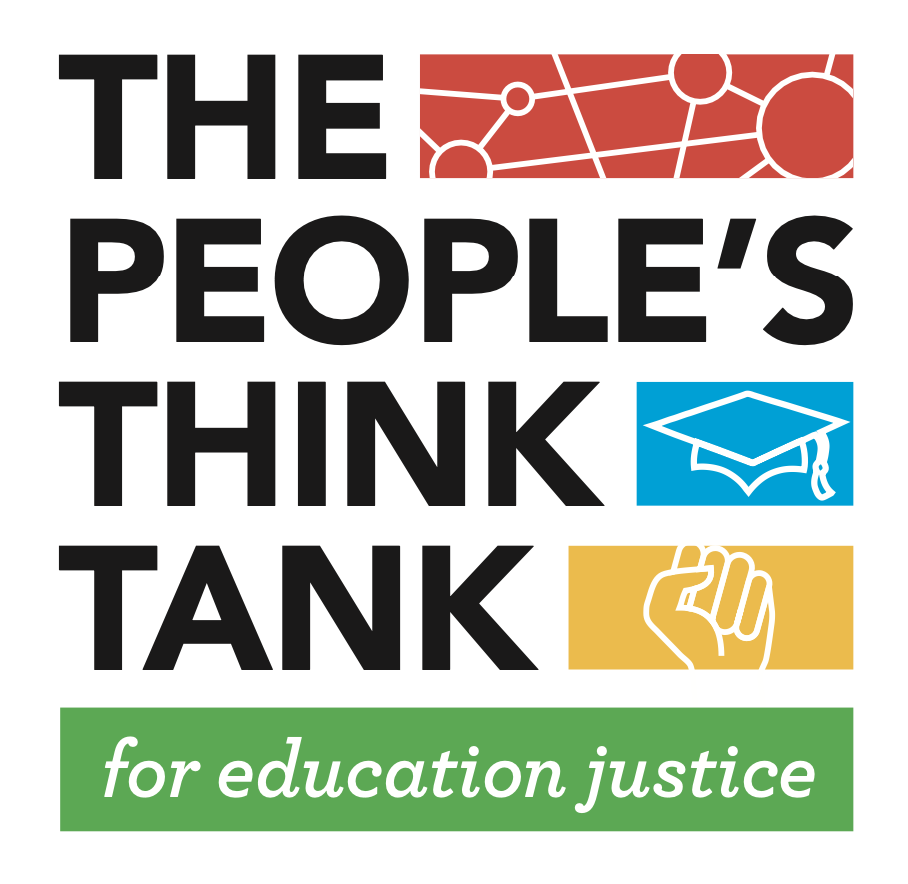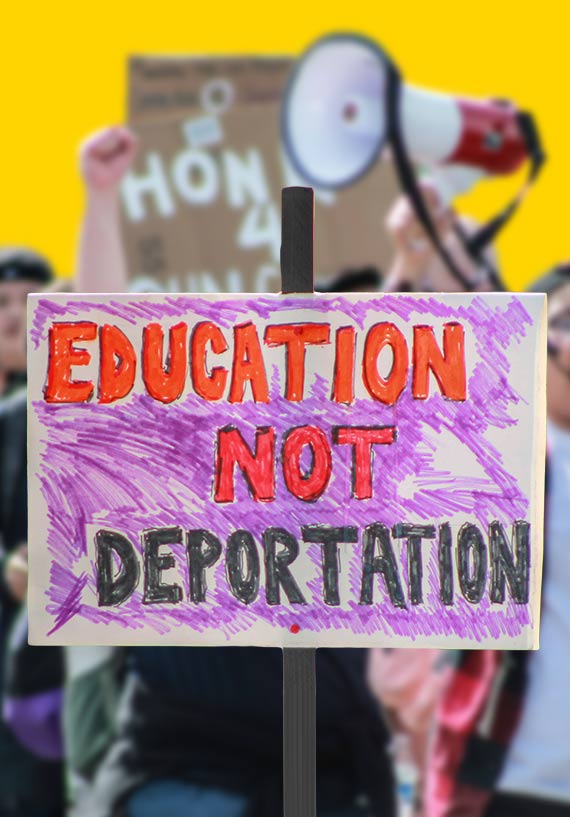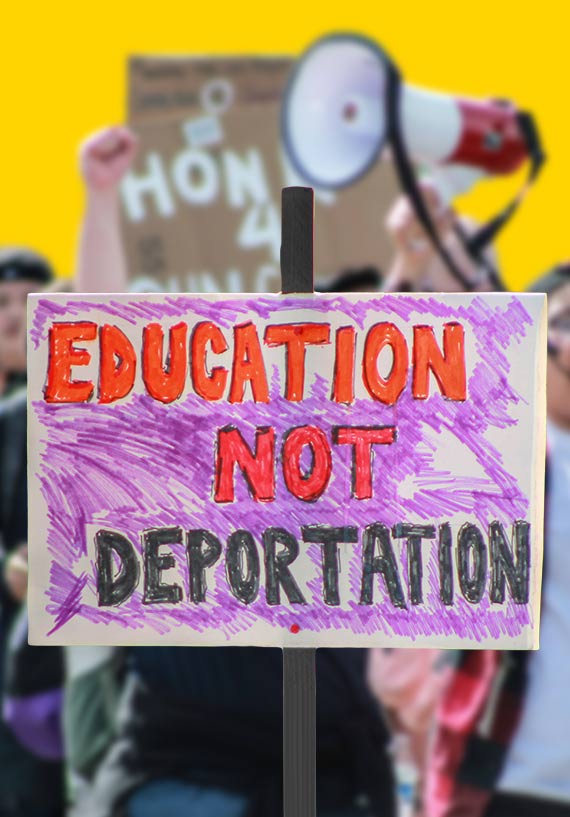By Emma Tynan, Sarah Kim Pak, Ignacia Rodriguez Kmec, Mark R. Warren
In 2017, a high school sophomore named Alex doodled the name of his Honduran hometown and his high school mascot on a desk. This small action, which could have been addressed by asking him to wash it off, started a chain of events that led to Alex’s deportation from the United States. Alex’s family fled Honduran gang violence in search of asylum in the United States. Employing strict monitoring policies meant to remove members of the MS-13 gang from New York schools, school administrators and the resident school resource officer (SRO) misinterpreted Alex’s doodles as gang symbols. Alex’s resulting three-day suspension alerted immigration officials that he could be a “threat” to the United States, and after a lengthy detention, he was deported back to Honduras.
School-to-Deportation Pipeline
Unfortunately, Alex’s story is not unique. A large number of public school students are drawn into the dragnet of immigration authorities and face the threat of deportation as a result of zero tolerance discipline and policing practices in schools. Almost three-quarters of a million undocumented students attend public schools in the United States. An additional 5.1 million students have at least one undocumented parent. While undocumented students are guaranteed public education under the 1982 Supreme Court ruling in Plyer v. Doe, many face significant challenges to their education as a result of the presence of police and SROs on their campuses and school referrals to law enforcement. In fact, they face what is called the school-to-deportation pipeline.
As we document in the book Willful Defiance, the presence of SROs on school campuses rose dramatically in the 1990s. There are now over 52,000 school resource officers across the country, with concentrations in schools that serve low-income students of color, including undocumented immigrants. Research shows that SROs are often called in for routine disciplinary matters, such as a student throwing a tantrum or doodling on school property. In schools where there are SROs, students are more likely to be arrested or referred to law enforcement. This is particularly anxiety-inducing for immigrant students, who fear the ramifications of contact with law enforcement. In many cases, the local police collaborate with immigration enforcement agencies and efforts.
For immigrant students facing strict disciplinary practices or referrals to law enforcement, these decisions made in the schools can harm their status in this country. Immigration officials often use suspensions and referrals to deny immigration relief or citizenship status. This was the case with Alex, whose short suspension led to a denial of his request for asylum and his eventual deportation. Incredibly high stakes are placed on students for behaving in a manner, like wearing a t-shirt featuring Lady Gaga or flashing the middle finger, that is fairly typical for teenagers. Additionally, when deportations do occur within a family, children are faced with ripple effects on their emotional, physical, developmental, and economic wellbeing.
Oftentimes, schools provide data and information for immigration officials that can be detrimental to students. In many cases, schools experience pressure and manipulation by immigration officials that lead to the handing over of documents. There is a lack of clarity among school officials whether disclosure of information is compulsory. In some cases, immigration officials have posed as local law enforcement and have used ruses to coerce cooperation where it is not required to gain access to information or individuals. Even when the schools are reluctant to cooperate, their sharing of data—whether incidental, knowing, or under a belief that the data shared is innocuous—with immigration officials can have serious consequences for their immigrant students and tends to sow distrust within the community.
Harming the Educational Environment
Even for students who do not end up in direct contact with immigration officials, their education is significantly harmed by strict disciplinary measures and coordination with law enforcement from inside the school. As mentioned above, the presence of law enforcement within the school can cause severe anxiety in immigrant students, which often results in decline in academic performance. This fear can ripple throughout the school community and can create a climate of fear that is not suitable for learning for any student.
Student attendance drastically falls off where there is a greater law enforcement presence. In one school, attendance decreased by 60% the day after an immigration raid. When students avoid classes out of fear, they are not able to take advantage of their educational rights. The fear of deportation disturbs the learning environment for all immigrant students, even those who do not end up in the school-to-deportation pipeline.
What Can Be Done?
A major step forward would be removal of SROs from public schools. Schools need to be safe havens for all students. Instead of punitive punishment and the criminalization of students, educators can invest in restorative practices that seek to create strong and caring relationships in schools.
In addition, school districts must end the practice of sharing data with Immigration and Customs Enforcement (ICE). School officials must understand that their participation in data sharing with immigration officials is not required by law. The tactics taken by immigration officials need to be called out, so that school officials understand their rights to refuse these requests. They should follow the lead of districts like the Fairfax County Public Schools that have taken steps to protect student data as part of their sanctuary school (or “safe school”) policies and uphold the right of undocumented students to stay in school and learn.
Learn More
Additional Resources: School-to-Deportation Pipeline
About the Authors
Emma Tynan is a PhD student in Public Policy at the University of Massachusetts Boston, where she focuses on issues of educational equity and justice.
Mark R. Warren is Professor of Public Policy and Public Affairs at the University of Massachusetts Boston and the author of Willful Defiance: The Movement to Dismantle the School-to-Prison Pipeline (Oxford University Press, 2021).
Sarah Kim Pak is a Staff Attorney at the National Immigration Law Center where she works to advance the rights of low-income immigrants through administrative and policy advocacy, litigation, and community education.
Ignacia Rodriguez Kmec is an Immigration Policy Advocate at the National Immigration Law Center where she engages in legal and policy analysis, education, and advocacy to support the integration of low-income immigrant youth and children through access to education.
The authors are members of the People’s Think Tank on Educational Justice.


